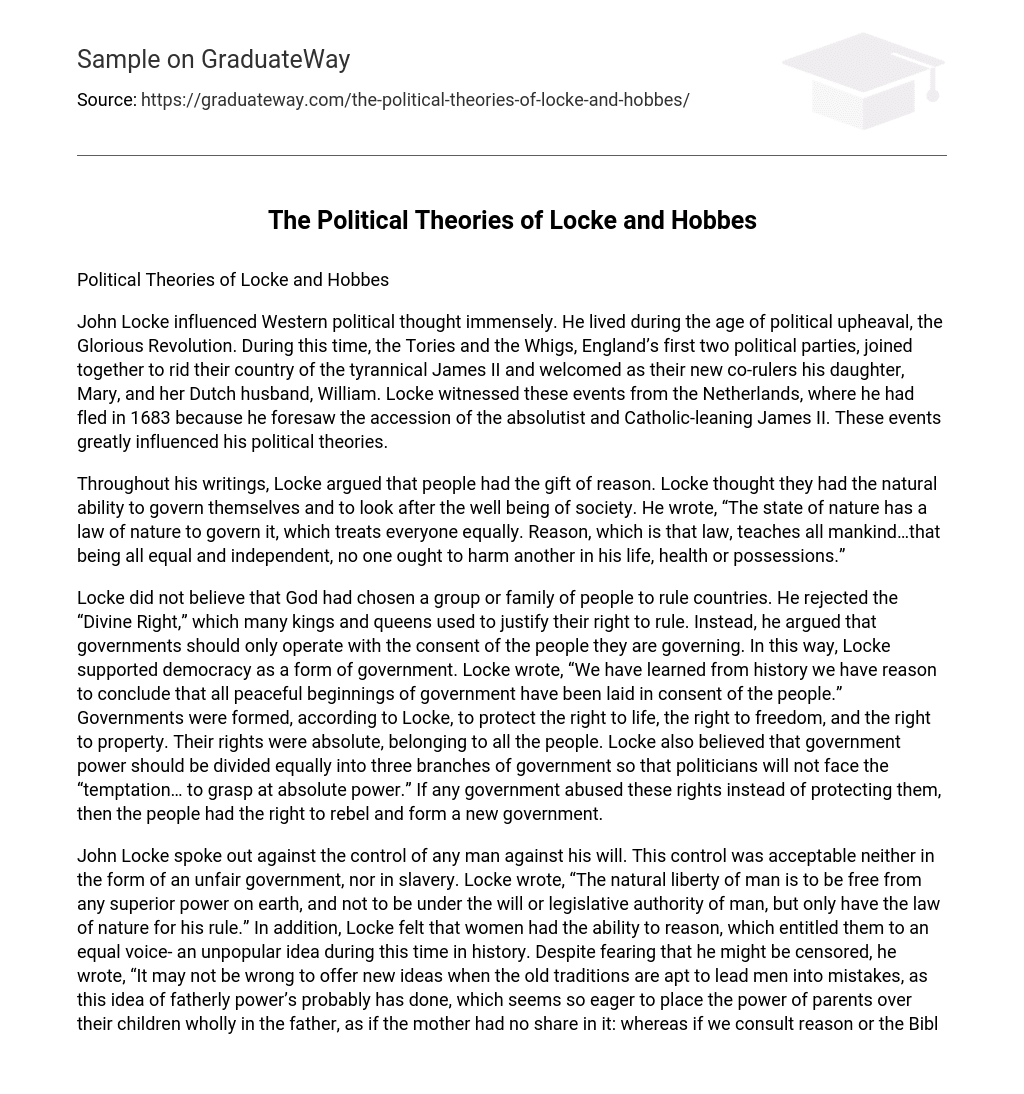John Locke had a profound influence on Western political philosophy. He witnessed the political upheaval of the Glorious Revolution, during which England’s initial political factions, namely the Tories and the Whigs, joined forces to overthrow tyrant James II from his position of power. In his place, James’ daughter Mary and her spouse William assumed joint rulership. While living in the Netherlands at that time, Locke closely observed these events as he had fled there in 1683 to escape the imminent reign of absolutist leader James II with leanings towards Catholicism. These experiences greatly influenced and shaped Locke’s theories on politics.
Locke’s writings emphasized the idea that people possessed the faculty of reason. According to Locke, they possessed an inherent capacity to self-govern and ensure the welfare of society. He expressed, “The state of nature is governed by a law that treats everyone fairly. Reason, which is this law, teaches all of humanity… that as equals and independent beings, no one should unlawfully harm another in terms of their life, health, or possessions.”
According to Locke, governments should only operate with the consent of the people they are governing, rejecting the notion of a chosen group or family to rule countries. This opposes the “Divine Right” often used by monarchs to justify their rule. Locke saw democracy as a favored form of government, stating that historically, all peaceful beginnings of government arose from the people’s consent. He believed that governments were established to safeguard the rights to life, freedom, and property, which he considered absolute and belonging to the entire population. Additionally, Locke advocated for the division of government power into three branches to prevent politicians from seeking absolute power. If a government failed to protect these rights and instead abused them, Locke maintained that the people had the right to rebel and establish a new government.
John Locke opposed any form of control imposed upon an individual against their consent, whether it be an unjust government or slavery. Locke argued that natural liberty entails being free from any higher authority on earth and not being subjected to the will or legislative power of man, but rather abiding by the law of nature. Additionally, Locke believed that women possessed the capacity for rational thinking, thus deserving an equal say in matters – a notion that was unpopular at the time. Despite his concerns about potential censorship, he boldly stated that it is not incorrect to introduce new ideas when traditional beliefs are prone to leading people astray. One such belief he challenged was the notion of paternal power that neglects the role of mothers, emphasizing reason and biblical principles that recognize the equal rights of both parents.
Thomas Hobbes had a unique perspective on human nature and the role of government, which differed from John Locke. Hobbes’s views were heavily influenced by his upbringing in England during a time of religious, social, and political unrest. He was particularly interested in understanding why individuals willingly submit to authority and sought to determine the ideal form of governance for England.
In 1651, Hobbes published Leviathan, his famous work where he argued that people have an inherent inclination towards evil and cannot be trusted to govern effectively. As a result, he advocated for an absolute monarchy – a system that grants complete power to a sovereign monarch – as the most appropriate approach.
Hobbes argued that humans were inherently self-interested individuals driven to improve their own situations. He contended that if people were left to their own devices, they would act on their malicious instincts. Thus, Hobbes believed that autonomous decision-making should not be entrusted to individuals. Additionally, he posited that nations, like individuals, pursued their own self-interests. In his view, each country engaged in an ongoing struggle for power and wealth. To support his perspective, Hobbes asked why people always carried arms and had keys to lock their doors if they were naturally in a state of war.
According to Hobbes, governments were established to safeguard individuals from their own selfishness and wickedness. The ideal form of government was one characterized by a powerful entity akin to a leviathan. Hobbes advocated for the rule of a monarch, as he believed that a country required an authoritative figure to provide guidance and leadership. Due to the inherent self-interest of people, Hobbes believed that democracy would never be successful. In his writings, Hobbes stated that “all mankind is in a perpetual and restless desire for power…that stops only in death.” Consequently, granting individuals power would lead to a hazardous scenario of “war of every man against every man,” resulting in a life that is “solitary, poor, nasty, brutish, and short.”
Despite his skepticism of democracy, Hobbes believed that a diverse group of representatives could prevent an unjust and oppressive king. During his lifetime, the influence of business on government grew, with financially influential individuals gaining power. To counterbalance this, Hobbes proposed individuals could have a say in government by selecting a representative to speak for them. He even coined the term “voice of the people” to express that one person could represent a group with similar views. However, it is important to note that this “voice” was only listened to and did not hold final decision-making power; that authority rested with the king.





